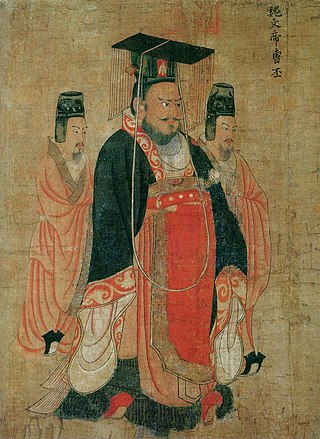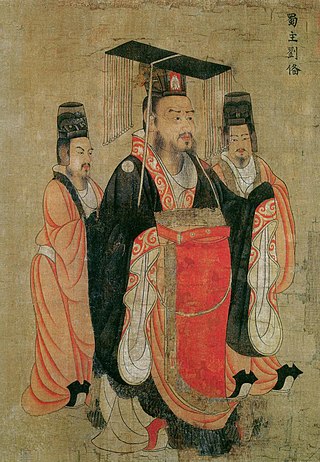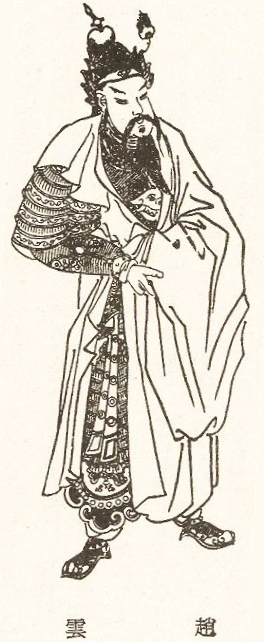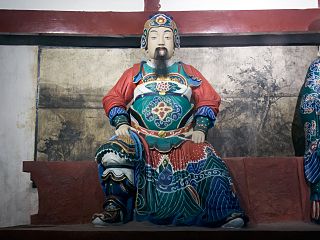Related Research Articles

Xiahou Dun, courtesy name Yuanrang, was a Chinese military general and politician serving under the warlord Cao Cao during the late Eastern Han dynasty of China. He served for a few months under Cao Cao's successor, Cao Pi, before his death. As one of Cao Cao's most trusted generals, Xiahou Dun aided the warlord in his campaigns against Lü Bu, Liu Bei, Sun Quan and others.

Cao Pi, courtesy name Zihuan, was the first emperor of the state of Cao Wei in the Three Kingdoms period of China. He was the second son of Cao Cao, a warlord who lived in the late Eastern Han dynasty, but the eldest son among all the children born to Cao Cao by his concubine, Lady Bian. According to some historical records, he was often in the presence of court officials in order to gain their support. He was mostly in charge of defence at the start of his career. After the defeat of Cao Cao's rival Yuan Shao at the Battle of Guandu, he took Yuan Xi's widow, Lady Zhen, as a concubine, but in 221 Lady Zhen died and Guo Nüwang became empress.

Liu Bei, courtesy name Xuande (玄德), was a Chinese warlord in the late Eastern Han dynasty who later became the founding emperor of Shu Han, one of the Three Kingdoms of China.

Zhao Yun, courtesy name Zilong (子龍), was a military general who lived during the late Eastern Han dynasty and early Three Kingdoms period of China. Originally a subordinate of the northern warlord Gongsun Zan, Zhao Yun later came to serve another warlord, Liu Bei, and had since accompanied him on most of his military exploits, from the Battle of Changban (208) to the Hanzhong Campaign (217–219). He continued serving in the state of Shu Han – founded by Liu Bei in 221 – in the Three Kingdoms period and participated in the first of the Northern Expeditions until his death in 229. While many facts about Zhao Yun's life remain unclear due to limited information in historical sources, some aspects and activities in his life have been dramatised or exaggerated in folklore and fiction. In the 14th-century historical novel Romance of the Three Kingdoms, he was lauded as a member of the Five Tiger Generals under Liu Bei.

Zhang He, courtesy name Junyi, was a military general serving under the warlord Cao Cao in the late Eastern Han dynasty of China. He continued serving in the state of Cao Wei under its first two rulers, Cao Pi and Cao Rui, during the Three Kingdoms period until his death.

Zhuge Liang's Northern Expeditions were a series of five military campaigns launched by the state of Shu Han against the rival state of Cao Wei from 228 to 234 during the Three Kingdoms period in China. All five expeditions were led by Zhuge Liang, the Imperial Chancellor and regent of Shu. Although they proved unsuccessful and ended up as a stalemate, the expeditions have become some of the best known conflicts of the Three Kingdoms period and one of the few battles during it where each side fought against each other with hundreds of thousands of troops, as opposed to other battles where one side had a huge numerical advantage.

Cao Zhen, courtesy name Zidan, was a military general of the state of Cao Wei during the Three Kingdoms period of China. He was an adopted son of Cao Cao, a warlord who rose to power in the late Eastern Han dynasty and laid the foundation for Wei. After Cao Cao's death and the end of the Eastern Han dynasty, Cao Zhen served under Cao Pi and Cao Rui, the first two emperors of Wei. He is best known for leading a successful defence of Wei from the first two of a series of invasions by Wei's rival state, Shu Han, between 228 and 229.

Jia Xu, courtesy name Wenhe, was an official of the state of Cao Wei during the early Three Kingdoms period of China. He started his career in the late Eastern Han dynasty as a minor official. In 189, when the warlord Dong Zhuo took control of the Han central government, he assigned Jia Xu to the unit led by Niu Fu, his son-in-law. In May 192, after Dong Zhuo was assassinated by Lü Bu, Jia Xu advised Li Jue, Guo Si and Dong Zhuo's loyalists to fight back and seize control of the imperial capital, Chang'an, from a new central government headed by Lü Bu and Wang Yun. After Li Jue and the others defeated Lü Bu and occupied Chang'an, Jia Xu served under the central government led by them. During this time, he ensured the safety of the figurehead Han emperor, Emperor Xian, who was being held hostage by Li Jue. He also attempted to prevent internal conflict between Li Jue and Guo Si, but with limited success. After Emperor Xian escaped from Chang'an, Jia Xu left Li Jue and briefly joined the general Duan Wei before becoming a strategist of the warlord Zhang Xiu. While serving under Zhang Xiu, he advised his lord on how to counter invasions by the warlord Cao Cao, who had received Emperor Xian in 196 and taken control of the central government. In 200, during the Battle of Guandu between Cao Cao and his rival Yuan Shao, Jia Xu urged Zhang Xiu to reject Yuan Shao's offer to form an alliance and instead surrender to Cao Cao. Zhang Xiu heeded his advice. Jia Xu then became one of Cao Cao's strategists.
Xiahou Shang, courtesy name Boren, was a Chinese military general and politician of the state of Cao Wei during the Three Kingdoms period of China. He was a distant younger relative of Xiahou Yuan and a close friend of Cao Pi, the first emperor of the Cao Wei state.

Cao Hong, courtesy name Zilian, was a Chinese military general of the state of Cao Wei during the Three Kingdoms period of China. He started his career in the late Eastern Han dynasty under the warlord Cao Cao, who was his older second cousin.

Wang Ping, courtesy name Zijun, was a military general of the state of Shu Han in the Three Kingdoms period of China. Originally a military officer serving under the warlord Cao Cao. In 219, he defected to Cao Cao's rival Liu Bei during the Hanzhong Campaign. Although he was a talented orator, Wang Ping never learned to read because he joined the army at a young age. However, he did not let this disadvantage stop him and had his clerk help him with his reports. Known for his self discipline, he steadily rose through the ranks to become a senior general. During his career, he defeated Zhang He, quelled Wei Yan's alleged rebellion and was the leading commander of the Shu forces during the Battle of Xingshi. The highest position he reached was Senior General Who Guards the North (鎮北大將軍).
Guo Huai, courtesy name Boji, was a Chinese military general of the state of Cao Wei during the Three Kingdoms period of China. He started his career towards the end of the Eastern Han dynasty under the warlord Cao Cao as a subordinate of Cao Cao's generals Xiahou Yuan and Zhang He. During the Three Kingdoms period, he served in Wei, the state established by Cao Cao's son Cao Pi, and lived through the reigns of four Wei emperors. From the 220s until his death in 255, he governed and defended Wei's western borders in Yong and Liang provinces. During this time, he resisted multiple invasions by Wei's rival state, Shu Han, and quelled some rebellions by local Qiang, Di and other non-Han Chinese tribes.
Huang Quan, courtesy name Gongheng, was a Chinese military general and politician of the state of Cao Wei during the Three Kingdoms period of China. He previously served under the warlords Liu Zhang and Liu Bei during the late Eastern Han dynasty and in the state of Shu Han during the early Three Kingdoms period before defecting to Cao Wei. Liu Bei relied heavily on Huang Quan for counsel in both domestic and foreign policy. Under the Wei government, however, Huang Quan was restricted to only internal affairs because even though the Wei emperor Cao Pi appreciated him for his talent, he doubted Huang Quan's allegiance and believed he was still secretly loyal to Liu Bei.

Deng Zhi, courtesy name Bomiao, was a government official, diplomat and military general of the state of Shu Han during the Three Kingdoms period of China. A descendant of Deng Yu, Deng Zhi started his career in the late Eastern Han dynasty under the warlord Liu Bei as a low-level officer in Pi County. After Liu Bei discovered his talent, Deng Zhi steadily rose through the ranks to become a county prefect and later a commandery administrator and imperial secretary. In 223, the Shu regent Zhuge Liang sent him as Shu's envoy to meet Sun Quan, the ruler of Shu's ally state Wu, and reestablish the Wu–Shu alliance against their common rival state Wei. Deng Zhi succeeded in his mission and earned praise from Sun Quan for strengthening Wu–Shu ties. In 227, Deng Zhi became a military general and he participated in the first Shu invasion of Wei by leading a decoy force with Zhao Yun to distract the Wei general Cao Zhen. Although they lost the battle, Deng Zhi and Zhao Yun managed to rally their troops to put up a firm defence during their retreat and minimise their losses. Following Zhuge Liang's death in 234, Deng Zhi rose to higher general ranks and was stationed in present-day Chongqing for about 10 years before he was recalled back to the Shu capital Chengdu in his 70s to serve as General of Chariots and Cavalry. In 248, he suppressed a rebellion in Fuling. He died in 251.
Huan Jie, courtesy name Boxu, was a Chinese official who lived during the late Eastern Han dynasty and served under the warlord Cao Cao. After the fall of the Eastern Han dynasty, he briefly served in the state of Cao Wei during the Three Kingdoms period.
Wu Zhi (177—230), courtesy name Jizhong, was an official and military general of the state of Cao Wei during the Three Kingdoms period of China.
Qin Lang, courtesy name Yuanming, was a military general of the state of Cao Wei during the Three Kingdoms period of China.
The Battle of Dongkou was a naval battle fought between October 222 and January 223 between forces of the state of Cao Wei and the Kingdom of Wu during the Three Kingdoms period of China. The battle concluded in a Wu victory.
The Battle of Jiangling was fought between the forces of the Cao Wei and Eastern Wu dynasties in the early Three Kingdoms period of China. The battle, which took place around present-day Jiangling County, Hubei, was an integral part of the Wei emperor Cao Pi's three-pronged campaign against the Wu leader Sun Quan. It spanned a period of about six months from October 222 to April 223. Of the three fronts, the most critical Wei attacks were concentrated against the Wu fortress at Jiangling.
Liu Ji (184–233), courtesy name Jingyu, was a Chinese politician of the state of Eastern Wu in the Three Kingdoms period of China. He was a descendant of the imperial clan of the Han dynasty and the eldest son of the minor warlord Liu Yao.
References
- ↑ (質別傳曰: ... 質黃初五年朝京師,詔上將軍及特進以下皆會質所,大官給供具。酒酣,質欲盡歡。時上將軍曹真性肥,中領軍朱鑠性瘦,質召優,使說肥瘦。真負貴,恥見戲,怒謂質曰:「卿欲以部曲將遇我邪?」驃騎將軍曹洪、輕車將軍王忠言:「將軍必欲使上將軍服肥,即自宜為瘦。」真愈恚,拔刀瞋目,言:「俳敢輕脫,吾斬爾。」遂罵坐。)Wu Zhi Biezhuan annotation in Sanguozhi vol. 21.
- ↑ Gautama Siddha: 《Treatise on Astrology of the Kaiyuan Era》 vol.13
- Chen, Shou (3rd century). Records of the Three Kingdoms (Sanguozhi).
- Luo, Guanzhong (14th century). Romance of the Three Kingdoms (Sanguo Yanyi).
- Pei, Songzhi (5th century). Annotations to Records of the Three Kingdoms (Sanguozhi zhu).